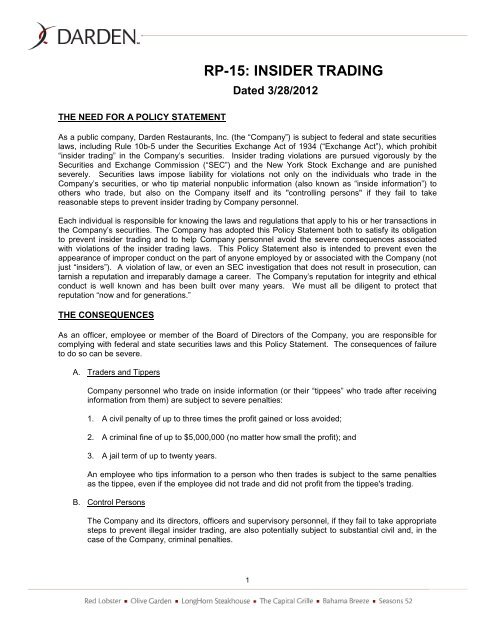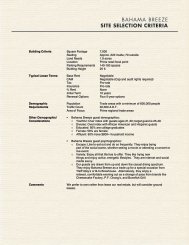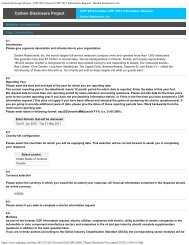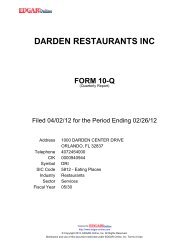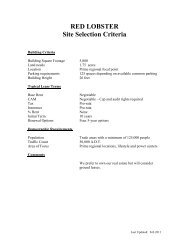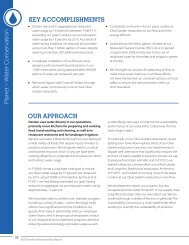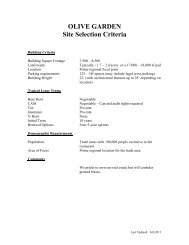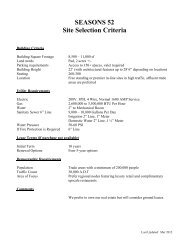Insider Trading Policy - Darden Restaurants
Insider Trading Policy - Darden Restaurants
Insider Trading Policy - Darden Restaurants
Create successful ePaper yourself
Turn your PDF publications into a flip-book with our unique Google optimized e-Paper software.
THE NEED FOR A POLICY STATEMENT<br />
RP-15: INSIDER TRADING<br />
Dated 3/28/2012<br />
As a public company, <strong>Darden</strong> <strong>Restaurants</strong>, Inc. (the “Company”) is subject to federal and state securities<br />
laws, including Rule 10b-5 under the Securities Exchange Act of 1934 (“Exchange Act”), which prohibit<br />
“insider trading” in the Company’s securities. <strong>Insider</strong> trading violations are pursued vigorously by the<br />
Securities and Exchange Commission (“SEC”) and the New York Stock Exchange and are punished<br />
severely. Securities laws impose liability for violations not only on the individuals who trade in the<br />
Company’s securities, or who tip material nonpublic information (also known as “inside information”) to<br />
others who trade, but also on the Company itself and its "controlling persons" if they fail to take<br />
reasonable steps to prevent insider trading by Company personnel.<br />
Each individual is responsible for knowing the laws and regulations that apply to his or her transactions in<br />
the Company’s securities. The Company has adopted this <strong>Policy</strong> Statement both to satisfy its obligation<br />
to prevent insider trading and to help Company personnel avoid the severe consequences associated<br />
with violations of the insider trading laws. This <strong>Policy</strong> Statement also is intended to prevent even the<br />
appearance of improper conduct on the part of anyone employed by or associated with the Company (not<br />
just “insiders”). A violation of law, or even an SEC investigation that does not result in prosecution, can<br />
tarnish a reputation and irreparably damage a career. The Company’s reputation for integrity and ethical<br />
conduct is well known and has been built over many years. We must all be diligent to protect that<br />
reputation “now and for generations.”<br />
THE CONSEQUENCES<br />
As an officer, employee or member of the Board of Directors of the Company, you are responsible for<br />
complying with federal and state securities laws and this <strong>Policy</strong> Statement. The consequences of failure<br />
to do so can be severe.<br />
A. Traders and Tippers<br />
Company personnel who trade on inside information (or their “tippees” who trade after receiving<br />
information from them) are subject to severe penalties:<br />
1. A civil penalty of up to three times the profit gained or loss avoided;<br />
2. A criminal fine of up to $5,000,000 (no matter how small the profit); and<br />
3. A jail term of up to twenty years.<br />
An employee who tips information to a person who then trades is subject to the same penalties<br />
as the tippee, even if the employee did not trade and did not profit from the tippee's trading.<br />
B. Control Persons<br />
The Company and its directors, officers and supervisory personnel, if they fail to take appropriate<br />
steps to prevent illegal insider trading, are also potentially subject to substantial civil and, in the<br />
case of the Company, criminal penalties.<br />
1
C. Company-Imposed Sanctions<br />
Violation of the Company's insider trading policy may result in Company-imposed sanctions,<br />
including termination of employment, whether or not the employee's failure to comply is a<br />
violation of law.<br />
STATEMENT OF INSIDER TRADING POLICY<br />
This policy applies to every officer and employee of the Company, every member of its Board of<br />
Directors, and any advisor and consultant to the Company, who is aware of material nonpublic<br />
information relating to the Company (“<strong>Insider</strong>s”). No <strong>Insider</strong> may, directly or through Family Members<br />
(defined below) or other persons or entities, (a) buy or sell Company securities (other than under a preapproved<br />
trading plan that complies with SEC Rule 10b5-1, described below) while in possession of<br />
material nonpublic information, or engage in any other action to take personal advantage of that<br />
information, or (b) disclose that information to others outside the Company, including Family Members<br />
and friends.<br />
In addition, no <strong>Insider</strong> who, in the course of working for the Company, learns of material nonpublic<br />
information about a company with which the Company does business (including a customer or supplier of<br />
the Company) may trade in that company's securities until the information becomes public or is no longer<br />
material.<br />
Small transactions, or ones that may seem necessary or justifiable for independent reasons (such as the<br />
need to raise money for a personal emergency), are not exceptions to these policies. The securities laws<br />
do not recognize such exceptions, and we want to avoid even the appearance of an improper transaction<br />
to preserve the Company's reputation for adhering to the highest standards of conduct. For purposes of<br />
this <strong>Policy</strong> Statement, references to “trading” in Company “securities” includes purchases and sales of<br />
Company stocks, bonds, notes, options, puts, calls, and other securities, and also includes sales of stock<br />
acquired by exercising employee stock options, and other trades made by giving investment direction<br />
under the Company’s employee benefit plans, as described below.<br />
A. Disclosure of Information to Others<br />
The Company is required under Regulation FD of the federal securities laws to avoid the<br />
selective disclosure of material nonpublic information. The Company has established procedures<br />
for releasing material information in a way that facilitates broad public dissemination of the<br />
information immediately upon its release. The procedures are described in detail in <strong>Policy</strong><br />
Statement RP-14 “Dissemination of Company Information.” The procedures govern the timing<br />
and nature of the Company’s disclosure of material information to outsiders or the public, and<br />
permit only specific Company spokespersons to discuss the Company with the news media,<br />
securities analysts and investors. You should become familiar with the procedures described in<br />
RP-14, and should not disclose information to anyone outside the Company, including Family<br />
Members, friends, vendors or suppliers, other than in accordance with those procedures. You<br />
also must not discuss material nonpublic information concerning the Company or its business in<br />
an Internet "chat room," similar Internet-based forums, or social networking websites. This <strong>Policy</strong><br />
Statement and related RP-14 are not intended to restrict necessary internal business<br />
communications with other employees on a “need to know” basis where you have a reason to<br />
expect that the other employee will not trade while in possession of the information.<br />
B. “Material” Information<br />
Information is material if there is a substantial likelihood that a reasonable investor would<br />
consider it important in making a decision to buy, hold, or sell securities, or that significantly alters<br />
the total mix of information publicly available about the Company. Any information that could be<br />
expected to affect the Company's stock price, whether it is positive or negative, should be<br />
2
considered material. Some examples (which are not exclusive) of information that ordinarily<br />
would be regarded as material are:<br />
1. Undisclosed quarterly earnings;<br />
2. Projections of future earnings or losses, or other earnings guidance;<br />
3. Other significant financial projections, strategic plans, forecasts or budgets, including plans<br />
concerning significant restaurant openings and closings and any related asset impairment<br />
charges;<br />
4. A pending or proposed merger, tender offer or joint venture;<br />
5. A pending or proposed acquisition or disposition of a significant asset;<br />
6. A change in control of the Company;<br />
7. Events involving the Company’s debt or equity securities, such as repurchases of common<br />
stock, a change in dividend policy, the declaration of a stock split, a change in the<br />
Company’s debt rating, or an offering of additional securities;<br />
8. A change in management, including members of the Board of Directors or senior executive<br />
officers;<br />
9. Changes in auditors or an auditor notification that the Company may no longer rely on the<br />
auditor’s reports;<br />
10. Significant legal proceedings or regulatory matters, whether actual, pending or threatened,<br />
or the resolution of those proceedings or matters;<br />
11. Development of a significant new product or process, including a new restaurant concept;<br />
12. Impending bankruptcy or the existence of severe liquidity problems;<br />
13. The gain or loss of a significant customer or supplier;<br />
14. News about a major contract award or cancellation of an existing contract;<br />
15. Significant price changes on major food products;<br />
16. Information about significant misstatements or omissions in the Company’s disclosure<br />
documents, whether intentional or inadvertent.<br />
There is no “bright-line” test to determine if information is “material”. The critical test is whether a<br />
reasonable investor would consider the information important in making an investment decision.<br />
In general, any significant information or event outside the Company’s normal course of business<br />
should be considered carefully to determine if it is material. This may require difficult judgments<br />
about facts and circumstances of particular cases. If you have questions regarding specific<br />
information, please contact the Company’s General Counsel.<br />
An area of particular concern that may require difficult judgments regarding materiality involves<br />
the Company’s quarterly earnings and sales results. Certain employees may possess this<br />
information through their particular job duties, or as a result of receiving weekly or monthly<br />
margin, Knapp-Track or other financial reports. Possession of Company-wide sales and earnings<br />
data that is inconsistent with the consensus expectations of the investment community could<br />
clearly be material. There are also times when information about just one of the Company’s<br />
several restaurant concepts would be material. For example, if the earnings or sales data about<br />
one of the Company’s larger concepts indicates that its results are notably better or worse than<br />
the investment community is expecting, that concept’s results could impact the Company’s overall<br />
results and be material. The best approach whenever you possess nonpublic earnings or sales<br />
data and are unsure whether the information is material, is to refrain from trading in Company<br />
securities until after that information is made public, or contact the Company’s General Counsel<br />
3
to discuss the situation prior to trading.<br />
C. Twenty-Twenty Hindsight<br />
Remember, anyone looking closely at your securities transactions will be doing so after the fact,<br />
with the benefit of hindsight. As a practical matter, before engaging in any transaction, you<br />
should carefully consider how the Company, enforcement authorities and others might view the<br />
transaction in hindsight.<br />
D. When Information is "Public"<br />
If you are aware of material nonpublic information, you may not trade until the information has<br />
been disclosed broadly to the marketplace (such as by press release or an SEC filing) and the<br />
investing public has had time to absorb the information fully. As a general rule, we allow two full<br />
business days to enable information to be fully absorbed by the marketplace. If, for example, the<br />
Company announces its earnings at 4:30 p.m. on a Monday, you should not trade in the<br />
Company's securities before the market opens on Thursday. If an announcement were made at<br />
4:30 p.m. on a Friday, Wednesday generally would be the first eligible trading day. Although<br />
technological advances have increased the speed at which investors have access to information,<br />
we believe it is prudent to wait two full business days before allowing trading to begin.<br />
E. Transactions by Family Members<br />
The insider trading policy applies to family members who reside with you, anyone else who lives<br />
in your household, and any family members who do not live in your household but whose<br />
transactions in Company securities are directed by you or are subject to your influence or control<br />
(such as parents or adult children who consult with you before they trade in Company securities)<br />
(“Family Members”). You are responsible for the transactions of Family Members and therefore<br />
should make them aware of the need to confer with you before they trade in the Company's<br />
securities.<br />
TRANSACTIONS UNDER COMPANY PLANS<br />
A. Stock Option Exercises<br />
The Company's insider trading policy does not apply to the exercise of an employee stock option<br />
where cash is paid separately for the exercise price of the option, or to the exercise of a tax<br />
withholding right under which you elect to have the Company withhold shares subject to an option<br />
to satisfy tax withholding requirements. The policy does apply, however, to any sale of stock<br />
in connection with the exercise of an option, including as part of a broker-assisted<br />
cashless exercise of an option, or any other market sale for the purpose of generating the<br />
cash needed to pay the exercise price of an option. Since most employees typically use<br />
the cashless exercise approach for exercising Company options, they should not, as a<br />
practical matter, exercise an option at any time they possess material nonpublic<br />
information.<br />
B. <strong>Darden</strong> Savings Plan and FlexComp<br />
The Company's insider trading policy applies to some (but not all) transactions in the Company<br />
stock fund in the <strong>Darden</strong> Savings Plan (including the 401(k) plan and the Employee Stock<br />
Ownership Plan) and the phantom Company stock fund in the FlexComp plan (collectively, the<br />
“Company Stock Funds”). The insider trading policy does not apply to automatic periodic<br />
purchases of stock or phantom stock in the Company Stock Funds through payroll deduction.<br />
The policy does apply, however, to voluntary elections you make involving the Company Stock<br />
Funds, including: (a) your initial election to enroll in the plans, if you will be making contributions<br />
4
to the Company Stock Fund, (b) an election to increase or decrease the percentage of your<br />
periodic contributions that will be allocated to the Company Stock Funds, (c) an election to make<br />
an intra-plan transfer of an existing account balance into or out of the Company Stock Funds,<br />
(d) an election to borrow money against your plan account if the loan will result in a liquidation of<br />
some or all of your Company Stock Fund balance, and (e) your election to pre-pay a plan loan if<br />
the pre-payment will result in allocation of loan proceeds to the Company Stock Fund. None of<br />
these actions should be taken when you possess material nonpublic information.<br />
C. Market Timing in the Company Stock Funds in Savings Plan or FlexComp<br />
Market timing, or frequent short-term trading of mutual fund shares, is viewed negatively by<br />
securities regulators and shareholder advocacy groups. Some investors have used their<br />
employee 401(k) plans or deferred compensation plans like FlexComp to engage in market<br />
timing. Market timing by even a small number of plan participants can be harmful to the other<br />
plan participants- even when it does not violate the law- by driving up the costs of administering<br />
the fund. In addition, market timing by employees in-and-out of the Company Stock Funds,<br />
particularly near the Company’s scheduled release of financial results, can suggest that the<br />
trades were made using inside information, even when this is not the case. The SEC and other<br />
regulators have taken steps to stop market timing practices and punish people who have broken<br />
the insider trading laws through market timing. In light of this close scrutiny, frequent and<br />
excessive trading in the Company Stock Funds is prohibited, and short-term trading in-and-out of<br />
the Company Stock Funds, especially during periods surrounding the Company’s scheduled<br />
release of financial results, is strongly discouraged. The Company reserves the right to<br />
investigate whether market timing is taking place in the Company Stock Funds or in other plan<br />
funds, and could impose greater restrictions to deter these practices. In addition, all executive<br />
officers and members of the Board of Directors of the Company who file reports with the SEC<br />
under Section 16 of the Securities Exchange Act (“Section 16 Filers”) must abide by SEC rules<br />
that prohibit non-exempt opposite way transactions in the Company Stock Funds within any sixmonth<br />
period, and must report all plan transactions involving Company stock or phantom stock on<br />
Form 4 or 5, as applicable.<br />
D. Employee Stock Purchase Plan<br />
The Company's insider trading policy does not apply to automatic periodic purchases through<br />
payroll deduction of Company stock in the Employee Stock Purchase Plan (ESPP). The policy<br />
does apply, however, to voluntary transactions, including your: (a) initial election to enroll in the<br />
ESPP for any enrollment period, (b) election to increase or decrease the amount of your<br />
automatic periodic contributions by payroll deduction to the ESPP, (c) election to cease payroll<br />
deductions altogether and withdraw any accumulated cash, and (d) sales of Company stock that<br />
were purchased under the ESPP, none of which should be done when you possess material<br />
nonpublic information (and, for Designated <strong>Insider</strong>s, should not be conducted during any Blackout<br />
Period as discussed below) . If you participate in the ESPP, and you do not possess material<br />
nonpublic information at the time you enroll, then all subsequent automatic investments by payroll<br />
deduction are allowed without restriction under this insider trading policy.<br />
Finally, Section 16 Filers are not permitted to participate in the ESPP.<br />
E. Dividend Reinvestment Plan<br />
The Company's insider trading policy does not apply to purchases of Company stock resulting<br />
from the automatic reinvestment of dividends paid on Company stock held in the Company's<br />
Direct Advantage Investment Program (“Dividend Reinvestment Plan”). The policy does apply,<br />
however, to voluntary purchases of Company stock under the Dividend Reinvestment Plan<br />
resulting from your initial election to participate in the plan, to make additional contributions, or to<br />
increase your level of participation. The policy also applies to your voluntary sale of any<br />
5
Company stock held in the plan.<br />
SPECIAL AND PROHIBITED TRANSACTIONS<br />
No officer, employee or member of the Board of Directors of the Company should engage in short-term or<br />
speculative transactions in the Company's securities. Other transactions, such as limit orders, may raise<br />
special issues because of the manner in which they are executed. You should observe the special rules<br />
described below regarding the following types of transactions:<br />
A. Short Sales<br />
Short sales are sales of securities which the seller does not own at the time the sell order is<br />
placed. Short sales would generally be interpreted by the market as an expectation by the seller<br />
that the securities will decline in value, and therefore that the seller has no confidence in the<br />
Company or its short-term prospects. In addition, short sales by an employee of the Company or<br />
member of its Board of Directors may reduce the employee’s incentive to improve the Company's<br />
performance. For these reasons, short sales of the Company's securities are prohibited. In<br />
addition, short sales by Company executive officers and members of its Board of Directors would<br />
violate Section 16(c) of the Exchange Act.<br />
B. Publicly Traded Options<br />
A transaction in publicly traded options is, in effect, a bet on the short-term movement of the stock<br />
and therefore, if made by an employee of the Company or member of its Board of Directors,<br />
creates the appearance that the trading is based on inside information. Transactions in publiclytraded<br />
options also may focus the employee's or Director’s attention on short-term performance<br />
at the expense of the Company's long-term objectives. Accordingly, transactions in puts, calls or<br />
other derivative securities based on the Company’s securities on an exchange or in any other<br />
organized market are prohibited. (Option positions arising from certain types of hedging<br />
transactions are governed by the section below captioned "Hedging Transactions.")<br />
C. Hedging Transactions<br />
Certain forms of hedging or monetization transactions, such as zero-cost collars and forward sale<br />
contracts, allow an employee to lock in much of the value of his or her stock holdings, often in<br />
exchange for all or part of the potential for upside appreciation in the stock. These transactions<br />
allow an employee or member of the Company’s Board of Directors to continue to own the<br />
covered securities, but without the full risks and rewards of ownership. When that occurs, the<br />
employee or Director may no longer have the same objectives as the Company's other<br />
shareholders. As a result, these types of transactions must be analyzed carefully. If you wish to<br />
engage in a transaction of this type, you must first obtain the clearance of the Company’s General<br />
Counsel, and there is no assurance that clearance will be granted. Any request for pre-clearance<br />
of a hedging or similar arrangement must be submitted to the General Counsel at least two<br />
weeks prior to the proposed execution of the proposed transaction and must set forth a<br />
justification for the proposed transaction.<br />
D. Margin Accounts and Pledges<br />
Securities held in a margin account may be sold by the broker without the customer's consent if<br />
the customer fails to meet a margin call. Similarly, securities pledged as collateral for a loan may<br />
be sold in foreclosure if the borrower defaults on the loan. Because a margin sale or foreclosure<br />
sale may occur at a time when the pledgor is aware of material nonpublic information or<br />
otherwise is not permitted to trade in Company securities, <strong>Insider</strong>s should take special<br />
6
precautions when placing Company securities in a margin account or when pledging Company<br />
securities as collateral for a loan. In general, in effecting these transactions, the insider should<br />
avoid placing undue reliance on the value of Company securities. Any insider who wishes to<br />
place Company securities in a margin account or pledge Company securities as collateral for a<br />
loan must submit a request for approval to the General Counsel at least two weeks prior to the<br />
proposed placement or pledge.<br />
E. Limit Orders<br />
A limit order is an order placed with a broker to buy or sell a security at a specific price or better.<br />
The broker will execute the trade only within the price restriction. For example, if the client places<br />
a limit order to sell stock at $33 when the price is at $31, the trade will not be executed unless<br />
and until the stock price hits $33. The Company discourages placing limit orders on the<br />
Company’s stock, because the orders can result in an automatic trade on a later date when the<br />
price is reached, regardless of whether the person placing the order possesses material<br />
nonpublic information at that time. If you feel you must use a limit order, it should be limited to a<br />
relatively short time, usually no more than a week. In addition, Designated <strong>Insider</strong>s should limit<br />
the duration of any limit order to a Window Period, and may not execute any transactions in<br />
Company securities, including pursuant to a previously placed limit order, during a Blackout<br />
Period.<br />
BLACKOUT AND WINDOW PERIODS FOR TRADING BY DESIGNATED INSIDERS<br />
A. Quarterly Blackout and Window Periods<br />
To help prevent inadvertent violations of the securities laws and to avoid even the appearance of<br />
trading on inside information, the General Counsel will maintain a list of “Designated <strong>Insider</strong>s,”<br />
which shall consist of: (i) members of the Company’s Board of Directors, (ii) all Company<br />
employees above the level of managing director and senior director, (iii) employees on the<br />
distribution list for the Company’s Disclosure Committee (who review the Company’s SEC<br />
reports), and (iv) such other persons as the General Counsel may designate from time to time. In<br />
addition to being subject to all the other limitations of this <strong>Policy</strong>, Designated <strong>Insider</strong>s and their<br />
Family Members may not conduct any transactions involving the Company’s securities covered<br />
by this <strong>Policy</strong> during a “Blackout Period” beginning three weeks prior to the end of each fiscal<br />
quarter and ending two full business days following the regularly scheduled final public release of<br />
the Company’s earnings results for that quarter. In other words, Designated <strong>Insider</strong>s may only<br />
conduct transactions in Company securities during the “Window Period” beginning two full<br />
business days following the regularly scheduled final public release of the Company’s quarterly<br />
earnings and ending three weeks prior to the close of the next fiscal quarter, and only then if they<br />
are comfortable that they do not otherwise possess any material non-public information<br />
concerning <strong>Darden</strong>. At present, the Company’s fiscal quarters generally end on the last Sunday<br />
in February, May, August and November, and the final earnings results for the quarters usually<br />
(but not always) are announced at 7:00 a.m. on a business day during the third full week in<br />
March, June, September and December. As such, for the regularly scheduled final earnings that<br />
were announced at 7:00 a.m. on Friday, March 23, 2012, the window for trading opened on<br />
Tuesday, March 27, 2012, and will end at the close of business on Friday, May 4, 2012. The<br />
exact dates of the Blackout and Window Periods for each fiscal year will be posted on the<br />
Company’s “Dish” intranet for reference by any Designated <strong>Insider</strong>, and updated from time to<br />
time.<br />
Under certain very limited circumstances, a Designated <strong>Insider</strong> may be permitted to trade during<br />
a Blackout Period, but only if the General Counsel concludes that the Designated <strong>Insider</strong> does<br />
not in fact possess material nonpublic information (because, for example, he or she is out on<br />
vacation and has not received any earnings or sales reports). Designated <strong>Insider</strong>s wishing to<br />
trade during a Blackout Period must contact the General Counsel for approval at least two<br />
7
usiness days in advance of any proposed transaction involving the Company’s securities. All<br />
determinations by the General Counsel shall be final and not subject to further review.<br />
B. Event-specific <strong>Trading</strong> Restriction Periods<br />
From time to time, an event may occur that is material to the Company and is known by only a<br />
few members of the Board of Directors or executives. So long as the event remains material and<br />
nonpublic, Directors, executive officers, and any other persons designated by the General<br />
Counsel may not trade in the Company's securities. In addition, the Company’s financial results<br />
may be sufficiently material in a particular fiscal quarter that, in the judgment of the General<br />
Counsel, Designated <strong>Insider</strong>s should refrain from trading in the Company’s securities even<br />
sooner than the typical Blackout Period. In that case, the General Counsel may notify the<br />
Designated <strong>Insider</strong>s that they should not trade in the Company’s securities, without disclosing the<br />
reason for the restriction. The existence of an event-specific trading restriction period or<br />
extension of a Blackout Period for Designated <strong>Insider</strong>s will not be announced to the Company as<br />
a whole, and should not be communicated to any other person. Even if the General Counsel has<br />
not designated you as a person who should not trade due to an event-specific restriction, you<br />
should not trade while aware of material nonpublic information. Exceptions cannot be granted<br />
during an event-specific trading restriction period.<br />
PRE-CLEARANCE PROCEDURES FOR SECTION 16 FILERS<br />
To further prevent even the appearance of trading on inside information, and to facilitate the filing of<br />
required SEC reports, Section 16 Filers and their Family Members may not engage in any transaction in<br />
the Company's securities (including a gift, contribution to a trust, or similar transfer) without first obtaining<br />
pre-clearance of the transaction from the General Counsel. A request for pre-clearance should be<br />
submitted to the General Counsel at least two days in advance of the proposed transaction. Section 16<br />
Filers may request pre-clearance by contacting the General Counsel by email, or in person or by phone.<br />
The General Counsel usually will respond the same day the request is received, although there can be no<br />
assurances of that timing, depending on travel schedules and other commitments. When Section 16<br />
Filers request pre-clearance, they should consider whether they may have any material nonpublic<br />
information about the Company, and should mention those circumstances. They should indicate whether<br />
they have effected any non-exempt “opposite-way” transactions within the past six months, and should be<br />
prepared to report their proposed transaction on an appropriate Form 4 or Form 5. They should also be<br />
prepared to comply with SEC Rule 144 and file Form 144, if necessary, at the time of any sale. Further<br />
information concerning the Section 16 and Rule 144 reporting requirements is provided in a<br />
memorandum titled “Section 16 and Rule 144 Compliance” that is provided by the Company to all Section<br />
16 Filers, additional copies of which are available upon request from the General Counsel.<br />
The General Counsel is under no obligation to approve a trade submitted for pre-clearance. If a Section<br />
16 Filer seeks pre-clearance and permission to trade is denied, he or she should refrain from initiating<br />
any transaction in Company stock, and should not inform any other person of the restriction.<br />
The pre-clearance policy does not apply to a stock option exercise if the option is to be exercised and no<br />
shares are to be sold, but it does apply to sales of stock issued upon the exercise of stock options,<br />
including same-day sales and cashless exercises. See “Stock Option Exercises” above.<br />
Designated <strong>Insider</strong>s who are not Section 16 Filers are not required to comply with the pre-clearance<br />
procedure described above.<br />
PREARRANGED TRADING PLANS<br />
SEC Rule 10b5-1 provides a defense from insider trading liability if trades occur under a pre-arranged<br />
“trading plan” that meets certain conditions. Under this rule, if you enter into a binding contract,<br />
instruction or written plan that specifies the amount, price and date on which securities are to be<br />
8
purchased or sold, or a pre-determined formula by which the amount, price and date of trades will be<br />
determined, and these arrangements are established at a time when you do not possess material<br />
nonpublic information, then you may claim a defense to insider trading liability if the transactions under<br />
the trading plan occur at a time when you have subsequently learned material nonpublic information. The<br />
details of the rule are complex, and a memo providing further information about the rule is available upon<br />
request from the General Counsel (the “10b5-1 Memo”). Any Designated <strong>Insider</strong> who wishes to<br />
implement a trading plan under SEC Rule 10b5-1 must first pre-clear the plan with the General Counsel<br />
and use the other procedures described in the 10b5-1 Memo. Transactions that comply with a precleared<br />
trading plan will not require further pre-clearance at the time of the transaction, but Section 16<br />
Filers are required to advise the General Counsel immediately upon the execution of a transaction so that<br />
appropriate SEC filings can be made timely.<br />
POST-TERMINATION TRANSACTIONS<br />
This <strong>Policy</strong> Statement continues to apply to your transactions in Company securities even after you have<br />
terminated employment. If you are aware of material nonpublic information when you terminate service<br />
as a member of the Board of Directors, officer or other employee of the Company, you may not trade in<br />
the Company’s securities until that information has become public or is no longer material. The preclearance<br />
procedures for Section 16 Filers, however, will cease to apply to transactions in Company<br />
securities upon the expiration of any Blackout Period or other event-specific trading restriction period that<br />
is applicable to a Section 16 Filer at the time of his or her termination of service.<br />
PERSONAL RESPONSIBILITY AND COMPANY ASSISTANCE<br />
Questions about this <strong>Policy</strong> Statement or its application to any proposed transaction should be directed to<br />
the Company’s General Counsel. Ultimately, however, the responsibility for adhering to this <strong>Policy</strong><br />
Statement and avoiding unlawful transactions rests with the individual employee.<br />
Amended and Restated 5/21/2002<br />
Amended 7/21/2003<br />
Amended 5/6/2004<br />
Amended 11/27/2007<br />
Amended 5/1/2008<br />
Amended 4/10/2009<br />
Amended 6/23/10<br />
Amended 1/1/12<br />
Amended 3/27/12<br />
Amended 3/28/12<br />
9


